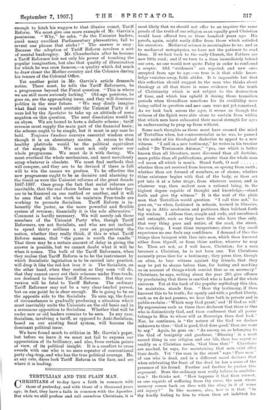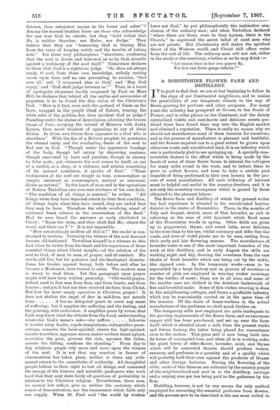TERTULLIAN AND THE PLAIN MAN.
CHRISTIANS of to-day have a faith in common with those of yesterday, and with those of a thousand years ago; in fact, they have a faiih in common-_with the Apostles. But while we still profess and call ourselves Christians, it is most likely that we should not offer to an inquirer the same proofs of the truth of our religion as an equally good Christian would have offered two or three hundred years ago. His proofs, again, might easily differ from those which satisfied his ancestors. Mediaeval science is meaningless to us; and as to mediaeval metaphysics, we have not the patience to read them. If we look back to the early Church, the Fathers are now little read; and if we turn to a time immediately behind our own, no one would now quote Paley in order to confound a sceptic. Old " evidences " are rejected, and new ones accepted from age to age,—so true is it that while know- ledge vanishes away, faith abides. It is impossible but that this reflection should suggest to the man who thinks about theology at all that there is some evidence for the truth of Christianity which is not subject to the destruction of time, and which has upheld it during those transition periods when threadbare sanctions for its credibility were being called in question and new OROS were not yet conceived. As we look back across the ages, it seems as though the witness of the Spirit were able alone to sustain from within that which men have exhausted their moral strength for ages in endeavouring to prop up from without.
Some such thoughts as these must have crossed the mind of Tertullian when, hot controversialist as he was, he paused in the midst of his theological dialectics to appeal to a new witness. "I call in a new testimony," he writes in his treatise called "Do Testimonio Animae," "yea, one which is better known than all literature, more discussed than all doctrine, more public than all publications, greater than the whole man
—I mean all which is man's. Stand forth, 0 soul whether thou art received from heaven, or sprung from earth ; whether thou art formed of numbers, or of atoms ; whether thine existence begins with that of the body, or thou art put into it at a later stage; from whatever source, and in whatever way, thou makest man a rational being, in the highest degree capable of thought and knowledge,—stand forth and give thy witness." It is the soul of the plain man that Tertullian would question. "I call thee not," he goes on, "as when, fashioned in schools, trained in libraries, fed up in Attic academies and porticoes, thou belchest forth thy wisdom. I address thee, simple and rude, and uncultured and untaught, such as they have thee who have thee only, that very thing pure and entire, of the road, the street, the workshop. I want thine inexperience, since in thy small experience no one feels any confidence. I demand of thee the things thou bringest with thee into man, which thou knowest either from thyself, or from thine author, whoever he may be. Thou art not, as I well know, Christian ; for a man becomes a Christian, he is not born one. Yet Christians earnestly press thee for a testimony; they press thee, though an alien, to bear witness against thy friends, that they may be put to shame before thee, for hating and mocking us on account of things which convict thee as an accesscry." Christians, be says, writing about the year 200, give offence by proclaiming that there is one God who is Lord of the whole universe. Yet at the back of the popular mythology this idea, be maintains, stands firm. " Bear thy testimony, if thou knowest this to be truth ; for openly and with a perfect liberty, such as we do not possess, we hear thee both in private and in public exclaim : Which may God grant,' and If God so will.' By expressions such as these thou declarest that there is One who is distinctively God, and thou coufessest that all power belongs to Him to whose will as Sovereign thou dost look." Nor, he continues, is "the nature of the God we declare unknown to thee : God is good, God does good,' thou are wont
to say." Again, he goes on: "As among us, as belonging to the God of benignity and goodness, ' Blessing ' is a most
sacred thing in our religion and our life, thou too sayest as
readily as a Christian needs, God bless thee.'" Christians are mocked, he says, for maintaining that men exist after their death. Yet "the man in the street" says "Poor man"
of one who is dead, and in a different mood declares that when celebrating the feast of the dead he has a sense of the
presence of his friend. Further and further be pushes this argument. Does the ordinary man really believe in annihila- tion? He thinks not. " How happens it that thou cursest, as one capable of suffering from thy curse, the man whose memory comes back on thee with the sting in it of sonic old injury? " In like manner, also, how is it that, " in thy kindly feeling to him to whom thou art indebted for favours, thou entreatest repose to his bones and ashes" ? Among the learned heathen there are those who acknowledge the one true God, he admits, but they "hold withal that He is neither Searcher, nor Ruler, nor Judge." They believe that they are " honouring God in freeing Him from the cares of keeping watch, and the trouble of taking note." Yet these very philosophers, "elsewhere, confessing that the soul is divine, and bestowed on us by God, stumble against a testimony of the soul itself." Conscience declares to them that God is a righteous judge. "So thou art always ready, 0 soul, from thine own knowledge, nobody casting scorn upon thee, and no one preventing, to exclaim, 'God sees all,' and I commend thee to God,' and 'May God repay,' and 'God shall judge between us." Then, in a burst of apologetic eloquence hardly surpassed by Paul on Mars Hill, he declares that behind all the myths and ceremonies of paganism is to be found the dim vision of the Christian's God. "How is it that, even with the garland of Ceres on the 'brow, wrapped in the purple cloak of Saturn, wearing the white robe of the goddess Isis, thou invokest God as judge ? Standing under the statue of Aesculapins, adorning the brazen image of Juno, arraying the helmet of Minerva with dusky figures, thou never thiukest of appealing to any of these deities. In thine own forum thou appealest to a God who is elsewhere." With the fire of a Hebrew prophet he proclaims the eternal unity and the everlasting desire of the soul to find rest in God. "Though under the oppressive bondage . of the body, though led astray by depraving customs, though enervated by lusts and passions, though in slavery to false gods ; yet, whenever the soul comes to itself, as out of a surfeit, or a sleep, or a sickness, and attains something of its natural soundness, it speaks of God." "These testimonies of the soul are simple as true, commonplace as simple, universal as commonplace, natural as universal, divine as natural." In the heart of man and in the operations of Nature Tertullian sees ever-new evidence of his own faith. "The condition of all things is renewal," he writes. "All things when they have departed return to their first condition, all things begin when they have ceased, they are ended that they may be born. Therefore the whole revolving wheel of existence bears witness to the resurrection of the dead." Had be ever heard the sentence so early attributed to Christ: "Raise the stone, and thou shalt find Me; cleave the wood, and there am I"? It is not impossible.
"How astonishingly modern all this is !" the reader is con- strained to exclaim. Certainly the witness of the soul does not become old-fashioned. Tertullian himself is a witness to this fact when he writes from his heart and his experience of those essential things which Christ taught,—of the relation of the soul to God, of man to man, of prayer, and of conduct. His words still live, but his polemics and his theological disserta- tions, his tirades against heresy, both before and after he became a Montanist, have turned to ashes. The modern man is weary to read them. Yet this paragraph upon prayer might well have been written yesterday. "Old-world prayer, indeed, used to free men from fires, and from beasts, and from famine ; and yet it had not then received its form from Christ. But how far more amply operative is Christian prayer ! It does not station the angel of dew in mid-fires, nor muzzle lions it has no delegated grace to avert any sense of suffering; but it supplies the suffering, and the feeling, and the grieving, with endurance : it amplifies grace by virtue, that faith may know what she obtains from the Lord, understanding what—for God's name's sake—she suffers Likewise it washes away faults, repels temptations, extinguishes perse- cutions, consoles the faint-spirited, cheers the high-spirited, escorts travellers, appeases waves, makes robbers stand aghast, nourishes the poor, governs the rich, upraises the fallen, arrests the falling, confirms the standing." From day to day religious people rely more and more upon the witness of the soul. It is not that any reaction in favour of obscurantism has taken place, neither is there any wide- spread return to the anaesthetic of authority. All thoughtful people believe in their right to test all things, and commend the energy of the historic and scientific professors who work hard that they may state fairly all questions of probability in relation to the Christian religion. Nevertheless, these men, we cannot but reflect, give us neither the certainty which comes of demonstration, nor the reassurance which faith only can supply. When St. Paul said "the world by wisdom
knew not God," he put philosophically the instinctive con- elusion of the ordinary man ; and when Tertullian declared "where there are three, even be they laymen, there is the Church," be expressed the secret belief of most men who are not priests. But Christianity still slakes the spiritual thirst of the Western world, and Christ still offers water from the well of life. The ordinary man will not ask, either in the study or the sanctuary, whether or no he may drink :—
"Let reason then at her own quarry fly, For how can finite gauge infinity ?"







































 Previous page
Previous page